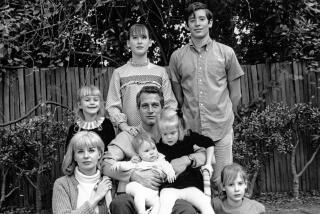Location, Location, Location : THE REICHMANNS: Family, Faith, Fortune, and the Empire of Olympia & York.<i> By Anthony Bianco</i> .<i> Times Books: 668 pp., $30</i>
- Share via
This is a fine, well-researched and elegantly written book--if you have the time and strength to read through its nearly 700 pages. It is packed with facts about the financial empire of the fascinating Reichmann family, from its humble origins in 18th century rural Hungary to its transformation into one of the 20th century’s wealthiest, most philanthropic Jewish families.
But not all the facts are especially interesting, and it takes Anthony Bianco almost 250 pages of “The Reichmanns: Family, Faith, Fortune, and the Empire of Olympia & York” to get to the Reichmanns’ arrival in Canada from Tangier in the 1950s and the birth of their construction firm, which grew into the biggest real estate company on Earth. Olympia & York’s charmed and frenetic progress toward an ultimate crescendo of collapse in 1992 becomes a gripping tale of huge talent, huge fortune (in both senses of the word) and even huger hubris.
Bianco explains that he needs to delve deeply into the Reichmann family’s past, in pre-World War I Hungary and Austria and then in Tangier, to illustrate their “abiding belief in themselves as a family of elect destiny.” By the end, something of this belief seems to have rubbed off on him too. He ends his saga, having recorded Paul Reichmann’s current bounce from corporate bankruptcy to mini-mogulhood, with the reverent prognosis that “the final chapter of the Book of Reichmann has not yet been written.”
But Bianco is no pushover for the Reichmann promotional line of pristine and perennial probity--in the sleaze of wartime Tangier as in the plush boardrooms of Toronto, New York and London. Given the family’s penchant for libel actions (which he duly chronicles), and given the liberal access he enjoyed to Paul and other key Reichmanns, Bianco does well to keep an even keel.
He investigates all the old allegations of hoary misdeeds, dismissing some, embracing some and leaving the reader to make up his own mind about others. At the same time, he unstintingly documents the remarkable reputation for straight dealing--”their word is their bond”--the Reichmanns built up in Toronto and thereafter. And he records with breathless approbation the Reichmann brothers’ munificent philanthropy in their heyday, almost all of it directed to Jewish haredi (ultra-Orthodox) causes. Bianco emerges from his complex task with his own reputation for accurate reporting and for healthy skepticism fairly intact.
He is at his most skeptical regarding the Tangier period. He does not believe that Samuel and Renee Reichmann, already well-to-do in Hungary, then in Vienna and later in Paris in the 1930s, arrived and stayed for a decade and a half in this moneymakers’ paradise by happenstance. “Between 1939 and 1942,” he writes, “nearly 40,000 Jews reached Palestine alone. The Reichmanns remained in Tangier . . . because it was everything they expected it to be--and more.” Samuel went into money-changing, which later evolved into banking.
Using excerpts from a privately published memoir by a family survivor, Bianco graphically interweaves the fates of the many family victims with the crushing ignorance and frantic but ultimately pathetic efforts of the lucky few in Tangier. The implication, perhaps unintended but no less stark, is that any pecuniary peccadilloes the refugees may have committed pale against the enormity of their loss of loved ones, and certainly against the fate that would have been their lot had they stayed put.
Bianco makes short shrift of the accusation, aired in the past, that Renee Reichmann used her aid packages for illicit purposes. He concedes “that relationships established through the family’s relief work were useful to Samuel in prospecting for money-changing business” but prefers to dismiss as anti-Semitic Office of Strategic Services reports from 1944 and 1945 that implicate Samuel in trafficking with the Nazis.
Bianco does allow himself, however, to roundly excoriate Samuel for entering into partnership with another Jewish merchant who had been blacklisted for trading with the Nazis. “Samuel debased himself,” he writes, adding: “No number of legal victories [in libel actions] could ever scrape the taint of Tangier from the Reichmann reputation.”
In all, Bianco says, Samuel’s career in Tangier “did not measure up to the standards of irreproachable respectability to which his sons aspired and came to epitomize in Canada.” But nor did the sons’ careers themselves, or at least some of them, measure up to those standards. Bianco’s judgment of Paul is that while “an honest man, in the end he fell well short of the standard of ethical irreproachability to which he aspired as a young merchant in Casablanca.” And there is some pretty scathing censure of eldest brother Edward’s business practices in Montreal, before he withdrew to Israel.
Among the six Reichmann siblings, Edward, who seems to have been Bianco’s most loquacious source, comes over as a loud-mouthed and bumptious extrovert with a way of stretching the truth, but bluff and engaging for all that, and splendidly generous. Albert, president of Olympia & York and Paul’s active partner throughout their odyssey, is less than a fully rounded figure. He seems almost bumbling, squandering hundreds of millions on ill-advised property deals in provincial American cities while Paul gets on with making billions (and losing them) in New York and London.
Driving and driven, Paul dominates this book as he dominated single-handedly the vast empire he created. Bianco is fascinated by this larger-than-life figure whose soft-spoken style and strait-laced religiosity adds to his remoteness.
But Bianco, though slightly overawed, undauntedly determines to come to grips with the paradox of Paul, the modest megalomaniac. As Olympia & York built ever more monumental edifices in major cities, he writes, “profits mattered less to [Paul] than his legacy as a developer--and a Reichmann.” What pleased him most about the Battery Park project in Manhattan (the World Financial Center) “was that it would leave ‘a prominent imprint on New York City.’ ” And later, in London, Bianco writes, “Canary Wharf held the potential . . . of putting the Reichmann imprint on the historic capital of the English-speaking world.”
Paul’s mistakes, in Bianco’s view, were of the same magnitude as his genius and his successes. He failed to factor into his calculations the possibility that the U.S. and other Western governments would succeed in putting a lid on the rampant inflation that had kept prices--especially property prices--spiraling upward. He invested billions in raw materials--oil and lumber, for instance--to hedge against a fall in real estate values. But these too declined in an anti-inflationary period, and Paul was left chasing his own tail to finance his mega-designs.
Bianco accuses Paul of “sentiment and avarice” for refusing to sell off some of his buildings while there was still time to save what was left. He also repeatedly lambastes Paul for his stubborn refusal to make full disclosure of Olympia & York’s affairs to its bankers before these turned into hostile creditors. Paul Reichmann himself says, “Olympia & York brought Canary Wharf down, not the other way around.” But Bianco maintains that “attempting to determine the causality of the disaster is as futile as trying to resolve the chronology of the chicken and egg.”
What fascinates Bianco even more than the prodigious dimensions of Paul Reichmann’s rise and fall is the interplay between the billionaire’s corporate audacity and his haredi humility. Repeatedly, though not explicitly, Bianco suggests that Paul’s unworldliness--he is depicted as the most ultra-Orthodox of the brothers and the most reclusive despite his Learjet--was ultimately part of his undoing, because it made him unequipped somehow to fully understand all the many components--economic, political, social but also personal--that went into his decision-making. Had he been more in touch with his non-Jewish or non-Orthodox executives outside business hours, let alone with his backers and his adversaries, he might have read reality better.
Bianco has invested great effort, and to good effect, to help his readers understand the religious world of the Reichmanns and their extended family. He records how, early in their career, they sought rabbinical advice on how to keep their tile-baking kiln fired up seven days a week without transgressing the Sabbath (it baked cracked and unsalable tiles on that day). Every construction contract they signed provided that the site lie silent on the Jewish Sabbath and festivals (as well as on Sundays and holidays). Their receptions for royalty and potentates were always strictly kosher. Their rabbis, their beliefs and their philanthropy are all comprehensively detailed. But Bianco, so careful not to let himself be swayed by the Reichmanns’ version of their saga, sometimes drops his guard in regard to Judaism and Jewry, internalizing and reproducing the Reichmanns’ own haredi gloss on things Jewish as though it were his own.
Usually this tendentious slant is not germane to the flow of the tale, but once or twice it jars; for instance: “Samuel Reichmann’s business career had been devoted to the construction of ever steeper firewalls of wealth designed to shelter his family from the malevolent forces arrayed against the religious Jew in Hitler’s Europe.” As though the irreligious Jew were safe.
More to Read
Sign up for our Book Club newsletter
Get the latest news, events and more from the Los Angeles Times Book Club, and help us get L.A. reading and talking.
You may occasionally receive promotional content from the Los Angeles Times.










